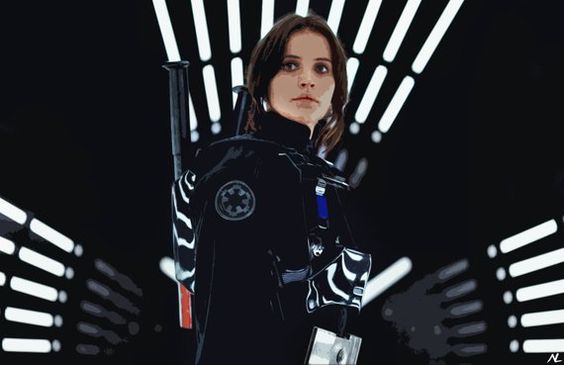
Here’s the latest installment of my Women of Star Wars series.
Jyn Erso from Rogue One is an interesting character to analyze, because she doesn’t initially align herself with either the Empire or the Alliance. Who is she and what does she want?
At the beginning of the film, I assumed that after witnessing the death of her mother at the hands of an Imperial, an Imperial who also took her father away, she’d naturally drift toward the Alliance. But no. When we first see her as an adult, she’s a criminal who is busted out of imprisonment by the Alliance for their own reasons.
My assumption was based on adult thinking; I forgot that as an 8-year old, Jyn might have understood things differently. All she knew was that she lost her parents to the Empire; and she was left in the hands of Saw Gerrera, an extremist formerly linked with the Alliance, who taught her how to survive, surely, but who also “abandoned” her. She trusts no one, and just lives day to day to survive.
I’ve read the Rogue One novelization, and it gets deeper into the character of Jyn. The book presents her as not just distrustful, but deeply damaged by these perceived abandonments; not only that, she spends many years hating her father. I’m going to delve deeper into the novelization in another post, but for now I’ll focus on Jyn as seen in the film.

We don’t necessarily see that hate for Galen Erso in the film; what we see is a person who has endured many losses, who has had to fight to survive, and who has become bitter with that life. When her father says when she’s a child, “Whatever I do, I do because I love you. Say you understand,” and she replies, “Yes, Papa,” we know that an 8 year old can’t possibly understand what’s happening and why. The loss of her father is painful and bewildering, and she’s angry without understanding why.
When Saw Gerrera leaves her behind because she’s a liability for his group, he left her able to take care of herself. We, the audience, may understand it intellectually, but as a 15-year old, Jyn just sees it as another abandonment. Is it any wonder she has no particular allegiances?
When she agrees to help the Alliance, it’s because she has no choice, really, but we get the feeling that she needs to find her father, if only to get answers. This is a personal quest for Jyn; she’s not there because she hates the Empire, or has any sympathy for the Alliance. She probably hates them both, along with everyone else in the galaxy.
Things start to change for her once she sees her father’s hologram message. She understands a little more about him, what he’s done, and why. It brings up painful, almost paralyzing emotions, and Cassian must pull her away to escape the destruction of Jedha’s Holy City.
Witnessing that destruction, a mere fraction of what the Death Star can do, brings her father’s actions into focus, and she begins to understand the wider implications of such a weapon. It’s not just about her and her anger; it’s about that little girl she saved in Jedha’s plaza, a rescue reduced to nothing because she died anyway, vaporized along with her mother, and everyone else there. She witnesses Chirrut’s and Baze’s loss of their home. The Death Star has become horrifyingly real.
On Eadu, Galen Erso dies in her arms (from Alliance bombs, no less). His last words to her are “It has to be destroyed.” At this point, Jyn becomes determined to do just that–not for the Alliance, but to give her father’s death meaning. It’s still personal. Her father built the damn thing himself so he could secretly put a weakness inside it. This cost him his family, and caused Jyn to live the painful life she’d lived. It has to all mean something. She must finish the job, if she’s to have any kind of personal resolution.

But it’s also not just personal anymore, either. Her confrontation with Cassian after Eadu moves her closer to this. She’s understandably upset when she learns he meant to kill her father all along. This perceived betrayal cuts deep, considering her trust issues. Cassian argues that he decided–on his own, against orders–not to pull the trigger. It’s not enough for Jyn, and she continues to harass him. He counters with, “You’re not the only one who’s lost everything.” Like her, he’s been suffering since he was a child. But, he says, “Some of us decided to do something about it.” Ouch.

She still grumbles, but it’s here that she’s beginning to come out of her own personal, painful bubble. Her faith in Cassian is restored when he gathers the Rogue One team after the Alliance Council decides against attack. The last third of the film shows Jyn being who she was meant to be: a woman with a purpose. She needs to destroy that Death Star not only to avenge her father and give his death meaning; not only to take back some power for herself after a life of powerlessness; but because it’s the right thing to do.
Jyn’s not looking to be a hero, but her sacrifice makes her one, along with the rest of the team. As she and Cassian watch their death approach, there’s sadness in her, certainly some fear, but no regret. She’s done what she’s meant to do.
How do you feel about Jyn’s character? Did she ring true for you? Comment below and we’ll talk about it!















